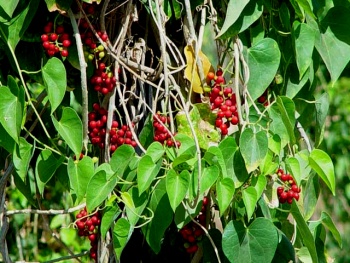Other Names : Tinospora crispa Willd, Makabuhay, Tinospora cordifolia Miers, Guduchi, Amritavalli, Chinnaruha, Giloy, Chittamritu, Amrit, Ambervel, Amrita, Gilo, Giloe, Giloya, Glunchanb, Guduchi, Gulvel, Gurcha, Heart-Leaved Moonseed, Heavenly Elixir, Indian Tinospora, Jetwatika, Moonseed, T. Cordifolia, TC, TCRE, TCRET, Tinospora, Tinospora Indien, Tinosporia Cordifolus, Tinospora Cordifolia Tinospora cordifolia is a shrub that is native to India. Its root, stems, and leaves are used in Ayurvedic medicine.
Special Precautions of Tinospora cordifolia
- Diabetes: Tinospora cordifolia might lower blood sugar levels. Use it cautiously if you have diabetes, and monitor your blood sugar levels. The doses of your diabetes medications might need to be adjusted.
- “Autoimmune diseases” such as multiple sclerosis (MS), lupus (systemic lupus erythematosus, SLE), rheumatoid arthritis (RA), or other conditions: Tinospora cordifolia might cause the immune system to become more active, and this could increase the symptoms of autoimmune diseases. If you have one of these conditions, it’s best to avoid using Tinospora cordifolia.
- Surgery: Tinospora cordifolia might affect blood sugar levels, so there is a concern that it might interfere with blood sugar control during and after surgery. Stop taking Tinospora cordifolia at least 2 weeks before a scheduled surgery.
- It is better to avoid guduchi during pregnancy and breastfeeding.
- Medications for diabetes (Antidiabetes drugs) interacts with TINOSPORA CORDIFOLIA
- Medications that decrease the immune system (Immunosuppressants) interacts with TINOSPORA CORDIFOLIA
Benefits and uses of Tinospora cordifolia are
All parts of guduchi plant are used for various medicinal purposes. Tinospora cordifolia contains many different chemicals that might affect the body. Some of these chemicals have antioxidant effects. Others might increase the activity of the body's immune system. Some chemicals might have activity against cancer cells in test animals. Most research has been done in test tubes or in animals. There isn’t enough information to know the effects of Tinospora cordifolia in the human body.
- Cholesterol : When administered to rats, Guduchi root extracts controlled serum and tissue cholesterol just as effectively as standard drugs used to control cholesterol.
- Diabetes : When the extracts from Guduchi were fed to diabetic rabbits and rats, their blood glucose levels fell significantly—particularly the fasting blood sugar levels. This implied that Guduchi improved the animals' metabolism of carbohydrates.
- Ulcers: Ulcers can result when excessive acid in stomach damages the stomach walls. Guduchi extracts have demonstrated an ability to heal such ulcers.
- Post-Menopausal Syndrome: Guduchi has been tested in women suffering with post-menopausal symptoms including breast discomfort, nausea, and fluid retention. Guduchi extracts reduced these symptoms—and was also helpful for general PMS.
- Liver Protection: Guduchi has been used for liver problems in Ayurveda for hundreds of years. Guduchi has been tested and shown to speed up the regeneration of damaged liver tissue.
- Cancer : In pre-clinical studies, Guduchi extracts have shown cancer-killing properties. When cancer cells were exposed to Guduchi extracts, their numbers dwindled significantly. Further research is needed in order to isolate the precise compounds in Guduchi that killed the cancer cells.
- Allergies (hay fever). A particular extract of Tinospora cordifolia (Tinofend, Verdure Sciences) seems to significantly decrease sneezing and nasal itching, discharge, and stuffy nose after about 2 months of treatment.
- General debility or weakness,dyspepsia or indigestion,fevers and urinary diseases.
- Antispasmodic,antipyretic or helps inreducing fevers and anti-inflammatory.
- Gout,which is characterized by the inflammation of the joints.
- Visceral obstruction and leprosy.
- The plant oil is effective in reducing pain and edema and in gout and skin diseases.
- The herb accords longevity, enhances memory, improves health, and bestows youth, betters complexion, voice, energy and luster of the skin.
- treating digestive ailments such as hyperacidity, colitis, worm infestations, loss of appetite, abdominal pain, excessive thirst, and vomiting and even liver disorders like hepatitis.
- Fresh juice of guduchi, when mixed with rock candy, speeds up the recovery in hepatitis patients.
- It helps in remedying ailments like raktapitta, anemia, cardiac debility, diabetes, sexual debility and splenic disorders.
- The starch of the plant serves as a household remedy for chronic fever, relieves burning sensation and increases energy and appetite.
- The decoction of guduchi, mixed with nimba and vasa, eases the itching and oozing.
- It benefits general weakness, dyspepsia, impotency, dysentery, secondary syphilis, tuberculosis, jaundice, constipation, leprosy, general debility, cutaneous rashes and condylomata.
- helps in getting rid of renal caliculi and reduces blood urea level.
- The decoction of guduchi and sunthi is a good combination for treating gout and rheumatic disorders.
- Guduchi juice, when taken with cow’s milk or lodhra, is effective in combating leucorrhea.
- The juice is mixed with cumin seeds and consumed to reduce the burning sensation caused due to pitta.
- The root of guduchi is a strong emetic and used for bowel obstruction.
- also used for diabetes, high cholesterol, allergic rhinitis (hay fever), upset stomach, gout, lymphoma and other cancers, rheumatoid arthritis (RA), hepatitis, peptic ulcer disease (PUD), fever, gonorrhea, syphilis, and to boost the immune system.
